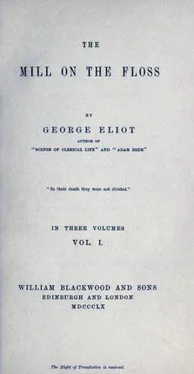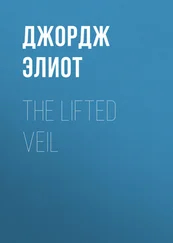"But I never heard of anything so strange and unreasonable. What harm can poor Philip have done? May I speak to Tom about it?"
"Oh no, pray don't, dear," said Maggie. "I'll go to him myself to-morrow, and tell him that you wish Philip to come. I've thought before of asking him to absolve me from my promise, but I've not had the courage to determine on it."
They were both silent for some moments, and then Lucy said,–
"Maggie, you have secrets from me, and I have none from you."
Maggie looked meditatively away from Lucy. Then she turned to her and said, "I should like to tell you about Philip. But, Lucy, you must not betray that you know it to any one — least of all to Philip himself, or to Mr. Stephen Guest."
The narrative lasted long, for Maggie had never before known the relief of such an outpouring; she had never before told Lucy anything of her inmost life; and the sweet face bent toward her with sympathetic interest, and the little hand pressing hers, encouraged her to speak on. On two points only she was not expansive. She did not betray fully what still rankled in her mind as Tom's great offence, — the insults he had heaped on Philip. Angry as the remembrance still made her, she could not bear that any one else should know it at all, both for Tom's sake and Philip's. And she could not bear to tell Lucy of the last scene between her father and Wakem, though it was this scene which she had ever since felt to be a new barrier between herself and Philip. She merely said, she saw now that Tom was, no the whole, right in regarding any prospect of love and marriage between her and Philip as put out of the question by the relation of the two families. Of course Philip's father would never consent.
"There, Lucy, you have had my story," said Maggie, smiling, with the tears in her eyes. "You see I am like Sir Andrew Aguecheek. I was adored once."
"Ah, now I see how it is you know Shakespeare and everything, and have learned so much since you left school; which always seemed to me witchcraft before, — part of your general uncanniness," said Lucy.
She mused a little with her eyes downward, and then added, looking at Maggie, "It is very beautiful that you should love Philip; I never thought such a happiness would befall him. And in my opinion, you ought not to give him up. There are obstacles now; but they may be done away with in time."
Maggie shook her head.
"Yes, yes," persisted Lucy; "I can't help being hopeful about it. There is something romantic in it, — out of the common way, — just what everything that happens to you ought to be. And Philip will adore you like a husband in a fairy tale. Oh, I shall puzzle my small brain to contrive some plot that will bring everybody into the right mind, so that you may marry Philip when I marry — somebody else. Wouldn't that be a pretty ending to all my poor, poor Maggie's troubles?"
Maggie tried to smile, but shivered, as if she felt a sudden chill.
"Ah, dear, you are cold," said Lucy. "You must go to bed; and so must I. I dare not think what time it is."
They kissed each other, and Lucy went away, possessed of a confidence which had a strong influence over her subsequent impressions. Maggie had been thoroughly sincere; her nature had never found it easy to be otherwise. But confidences are sometimes blinding, even when they are sincere.
Chapter IV. Brother and Sister
Maggie was obliged to go to Tom's lodgings in the middle of the day, when he would be coming in to dinner, else she would not have found him at home. He was not lodging with entire strangers. Our friend Bob Jakin had, with Mumps's tacit consent, taken not only a wife about eight months ago, but also one of those queer old houses, pierced with surprising passages, by the water-side, where, as he observed, his wife and mother could keep themselves out of mischief by letting out two "pleasure-boats," in which he had invested some of his savings, and by taking in a lodger for the parlor and spare bedroom. Under these circumstances, what could be better for the interests of all parties, sanitary considerations apart, than that the lodger should be Mr. Tom?
It was Bob's wife who opened the door to Maggie. She was a tiny woman, with the general physiognomy of a Dutch doll, looking, in comparison with Bob's mother, who filled up the passage in the rear, very much like one of those human figures which the artist finds conveniently standing near a colossal statue to show the proportions. The tiny woman curtsied and looked up at Maggie with some awe as soon as she had opened the door; but the words, "Is my brother at home?" which Maggie uttered smilingly, made her turn round with sudden excitement, and say,–
"Eh, mother, mother — tell Bob! — it's Miss Maggie! Come in, Miss, for goodness do," she went on, opening a side door, and endeavoring to flatten her person against the wall to make the utmost space for the visitor.
Sad recollections crowded on Maggie as she entered the small parlor, which was now all that poor Tom had to call by the name of "home," — that name which had once, so many years ago, meant for both of them the same sum of dear familiar objects. But everything was not strange to her in this new room; the first thing her eyes dwelt on was the large old Bible, and the sight was not likely to disperse the old memories. She stood without speaking.
"If you please to take the privilege o' sitting down, Miss," said Mrs. Jakin, rubbing her apron over a perfectly clean chair, and then lifting up the corner of that garment and holding it to her face with an air of embarrassment, as she looked wonderingly at Maggie.
"Bob is at home, then?" said Maggie, recovering herself, and smiling at the bashful Dutch doll.
"Yes, Miss; but I think he must be washing and dressing himself; I'll go and see," said Mrs. Jakin, disappearing.
But she presently came back walking with new courage a little way behind her husband, who showed the brilliancy of his blue eyes and regular white teeth in the doorway, bowing respectfully.
"How do you do, Bob?" said Maggie, coming forward and putting out her hand to him; "I always meant to pay your wife a visit, and I shall come another day on purpose for that, if she will let me. But I was obliged to come to-day to speak to my brother."
"He'll be in before long, Miss. He's doin' finely, Mr. Tom is; he'll be one o' the first men hereabouts, — you'll see that."
"Well, Bob, I'm sure he'll be indebted to you, whatever he becomes; he said so himself only the other night, when he was talking of you."
"Eh, Miss, that's his way o' takin' it. But I think the more on't when he says a thing, because his tongue doesn't overshoot him as mine does. Lors! I'm no better nor a tilted bottle, I ar'n't, — I can't stop mysen when once I begin. But you look rarely, Miss; it does me good to see you. What do you say now, Prissy?" — here Bob turned to his wife, — "Isn't it all come true as I said? Though there isn't many sorts o' goods as I can't over-praise when I set my tongue to't."
Mrs. Bob's small nose seemed to be following the example of her eyes in turning up reverentially toward Maggie, but she was able now to smile and curtsey, and say, "I'd looked forrard like aenything to seein' you, Miss, for my husband's tongue's been runnin' on you, like as if he was light-headed, iver since first he come a-courtin' on me."
"Well, well," said Bob, looking rather silly. "Go an' see after the taters, else Mr. Tom 'ull have to wait for 'em."
"I hope Mumps is friendly with Mrs. Jakin, Bob," said Maggie, smiling. "I remember you used to say he wouldn't like your marrying."
"Eh, Miss," said Bob, "he made up his mind to't when he see'd what a little un she was. He pretends not to see her mostly, or else to think as she isn't full-growed. But about Mr. Tom, Miss," said Bob, speaking lower and looking serious, "he's as close as a iron biler, he is; but I'm a 'cutish chap, an' when I've left off carrying my pack, an' am at a loose end, I've got more brains nor I know what to do wi', an' I'm forced to busy myself wi' other folks's insides. An' it worrets me as Mr. Tom'll sit by himself so glumpish, a-knittin' his brow, an' a-lookin' at the fire of a night. He should be a bit livelier now, a fine young fellow like him. My wife says, when she goes in sometimes, an' he takes no notice of her, he sits lookin' into the fire, and frownin' as if he was watchin' folks at work in it."
Читать дальше












